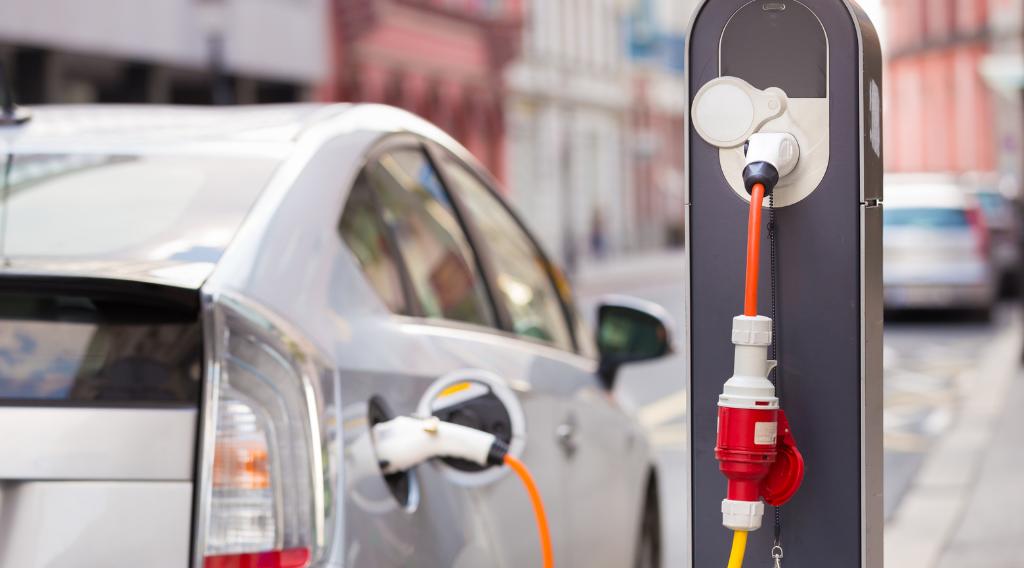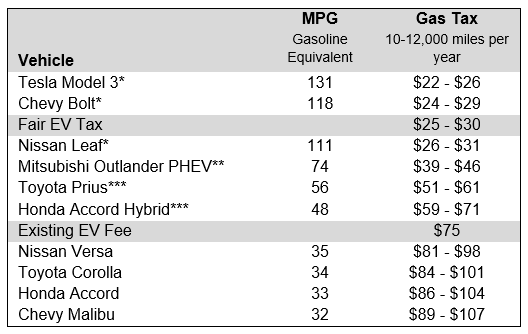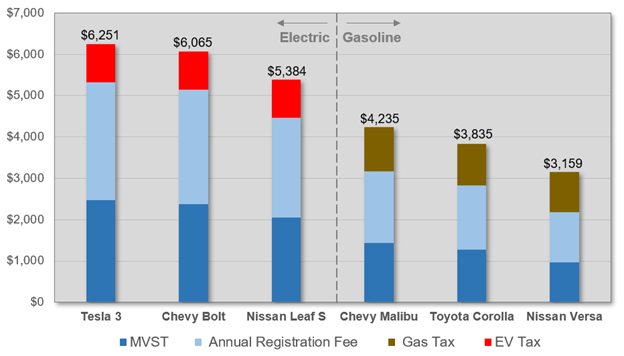Position Statement: Unfair Taxes for Electric Vehicles
May 11, 2021 | Brendan Jordan and Katelyn Bocklund | Policy

This position is supported by the following Drive Electric Minnesota Policy Committee members:
Alliance for Transportation Electrification
American Lung Association in Minnesota
City of Minneapolis
Connexus Energy
Elk River Municipal Utilities
Fresh Energy
Great River Energy
Minnesota Electric Vehicle Owners
Minnesota Power
Otter Tail Power Company
Plug In America
Shift2Electric
Xcel Energy
Electric vehicle (EV) users should pay their fair share for the use of Minnesota roads, but they should not pay MORE than owners of equivalent conventional vehicles or than their fair share. Upkeep for Minnesota’s roads relies significantly on the Highway Users Tax Distribution Fund, which is funded through a combination of fuel tax revenue (including gasoline tax and $75 EV tax), license fees (including registration taxes), and motor vehicle sales taxes. Auto parts sales taxes and other sources also provide funding.
Why is Drive Electric Minnesota concerned about unfair new taxes on EVs?
- EVs already pay more than their fair share. EV drivers currently pay a $75 annual tax in lieu of a gas tax in addition to paying more in motor vehicle sales tax and registration tax than someone buying a comparable gasoline vehicle. In total highway taxes, EV owners already pay more over the life of the vehicle than the average gas vehicle driver, as shown in figure 1.
- Inconsistent with the user-pays principle: The current gas tax model assesses a fee on a driver based on their vehicle’s fuel economy (miles per gallon) and how much they drive. Drivers of vehicles with low fuel economy (few miles per gallon) need to fuel their tank more, as do drivers that drive a lot. Since the gas tax is assessed on a per gallon basis, drivers that fuel their tank more frequently end up paying the most. The same principle should apply to an EV driver.
- Increasing EV taxes above and beyond what drivers of conventional vehicles pay is discriminatory and will discourage EV purchasing. Several bills have proposed EV taxes much higher than what comparative gasoline vehicles pay annually—some as high as $229 per year. As shown in table 1, many gasoline vehicle users pay less than $100 per year based on average fuel economy and miles driven.
- Minnesota should not discourage a new technology. Assessing EVs with higher taxes than equivalent gasoline vehicles discourages the adoption of a technology that promises to bring benefits to Minnesotans (e.g., improved air quality, reduction in health impacts associated with poor air quality, cost savings, etc.).
Drive Electric Minnesota’s position:
- Consistent: Drive Electric Minnesota supported the existing $75 EV tax when it was passed as an imperfect proxy for the gas tax but prefers a consistent approach that reflects the actual fuel economy and miles driven of EVs. Solutions to increase highway funding should be consistent for all vehicles and drivers, and not single out certain classes of vehicle like EVs and treat them differently.
- Lower: A tax for EVs, which get more than 100 mpg, should be consistent with the motor fuel taxes paid by the most efficient vehicles on the roads. A fair and consistent EV tax would be $25-30.
- Later: A tax for EVs should recognize that EVs pay more today in registration and motor vehicle sales taxes and should be delayed until EV prices (and taxes) drop to a level consistent with comparable gasoline cars. Experts estimate EVs will cost the same as gasoline cars by 2025-2030. Drive Electric Minnesota recommends an effective date for an EV tax of January 1, 2025. We are also interested in and willing to consider mileage-based user-tax proposals and/or those that would have EV drivers pay the same tax as gas-powered vehicles as long as they apply to all vehicles fairly and take into account differences in fuel economy and actual impacts on roads by different vehicle types.
Table 1. Annual gas tax paid based on fuel economy: A fair reflection of efficiency

*Fully electric vehicles | **Plug-in hybrid vehicles (already pay gas tax) | ***Hybrid vehicles (already pay gas tax) Source: Data based on http://www.fueleconomy.gov/feg/findacar.shtml. As shown in table 1, gasoline motor fuel taxes paid annually are dependent on the fuel economy of each car with higher efficiency cars paying less annual motor fuel tax. Table authored by Great Plains Institute, 2021
Figure 1. Lifetime cumulative taxes paid by popular model year 2020 electric and gasoline cars (12-year lifetime)

As shown in figure 1, EVs pay more per year than comparable gasoline vehicles in registration tax and motor vehicle sales tax (MVST) in Minnesota. This more than makes up for the gas tax that they do not pay. Figure authored by Great Plains Institute, 2021.
Download a copy of this statement here.
Facilitated by the Great Plains Institute, Drive Electric Minnesota (DEMN) is a partnership of electric vehicle (EV) champions, including automakers and auto dealers, utilities, charging companies, environmental groups, and state and local government. DEMN paves the way for the deployment of EVs and charging infrastructure through public-private partnerships, financial incentives, education, technical support, and public policy. Learn more at https://driveelectricmn.org/
